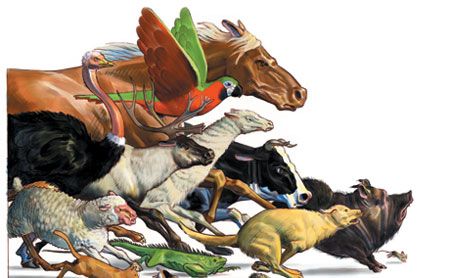A little BS isnt a bad thingor is it?
Just because youre the veterinarian doesnt mean you can get away with everything, Dr. Brock realizes.

Here's the standard definition of BSarrhea: a condition in which BS is discharged from the mouth frequently and in a fluid form at least three times a day.
BSarrhea may or may not be a sign of disease; in some cases it can be a variation of normal. I think you know what I speak of here. We all know a person who seems to be the king or queen of BS. When it comes to veterinarians, a little BS is not always a bad thing. I think we all want a little joking around and personality in our doctors.
I'm genetically programmed to have mild chronic BSarrhea and was trained straight out of veterinary school by a seasoned practitioner of the art. But one has to be careful because of the increasingly dramatic effect BSarrhea can have. Let me give you an example:
I'd been out of veterinary school and practicing for exactly one week when Laverne and Pappie Evans showed up pulling a long stock trailer with a single cow inside. The cow had gone down the night before, so they put her in the trailer and brought her to town to see what was up.
They vividly described her history as we walked to the trailer to start the exam. Laverne opened the gate and continued bantering about the cow. I began looking at the critter, whose fanny was facing the back of the trailer, and noticed there were maggots under her tail.
Laverne noticed them about the same time I did. “Would you look at that, Pappie!” she said furiously. “Them maggots weren't there last night. How long does it take a fly egg to develop into a maggot, Dr. Bo?”
I had just graduated from veterinary school a few short days before and had become accustomed to professors asking me questions I didn't know the answers to. It's almost a game with them-they ask you question after question until they finally stump you, and then they're happy.
I'd get a look on my face when they asked me something I didn't know. I'd squint with my right eye and shift my glance to the left. When I'd answer the question, which you always had to do whether you knew the right answer or not, my voice would go up an octave and my right shoulder would raise a bit. The professor would then rebuke me for a moment and eventually give me the correct answer.
I had no idea how long it took to hatch a fly egg, but just like in veterinary school, I squinted, shifted my eyes, raised my voice an octave, and said, “Oh, about 24 hours!”
“Did you hear that, Pappie?” Laverne said. “I had no idea it happened that fast. Can you believe that?”
What? She believed it! And I didn't get rebuked by a professor or given the correct answer. Sheesh, this was a lot different than veterinary school.
If you're good at BS, you may be liable to fall into the auto-rhetoric syndrome trap. Auto-rhetoric syndrome is when someone pathologically believes their own rhetoric (BS). This is a problem.
I found myself headed down the road to auto-rhetoric syndrome soon after the fly egg encounter. I could say anything, and since I was the “doctor,” people seemed to believe me. Shame on me.
I was quick to see that I needed to be careful, and I set about doing something about it. Over the next several years I studied and took the equine practitioner boards and learned to say, “I don't know,” rather than raising a shoulder with a squint and a glance. But you have to be careful-there are a lot of folks out there who believe their own BS.
Bo Brock, DVM, owns Brock Veterinary Clinic in Lamesa, Texas. His latest book is Crowded in the Middle of Nowhere: Tales of Humor and Healing From Rural America.
FDA approves oral drug for broad canine protection against parasites
October 7th 2024Elanco's lotilaner, moxidectin, praziquantel, and pyrantel chewable tablets (Credelio Quattro) provide a single monthly dose for protection against fleas, ticks, heartworms, roundworms, hookworms, and 3 species of tapeworm.
Read More
dvm360 announces winners of the Veterinary Heroes program
Published: September 6th 2024 | Updated: November 5th 2024This year’s event is supported by corporate sponsor Schwarzman Animal Medical Center and category sponsors Blue Buffalo Natural, MedVet, Banfield Pet Hospital, Thrive Pet Healthcare and PRN Pharmacal.
Read More